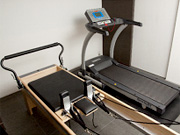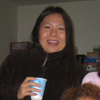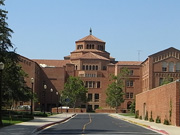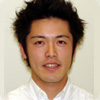| Period: |
|
Use a period [ . ] at the end of a sentence that makes a statement. There is no space between the last letter and the period. Use one space between the period and the next letter. |
| |
|
|
Use a period at the end of a command:
*Please turn in your homework by Friday. |
| |
|
|
At the end of an indirect question:
*The teacher asked why Maria hadn't turned in her homework. |
| |
|
|
And with abbreviations:
*I arrived in Washington, D.C., at 6 p.m. |
| |
|
|
|
| Comma: |
|
Comma's are used mainly to separate ideas in a sentence. Since this is a very in-depth topic, please stand by for next month's newsletter at which time I will go into comma usage in depth. |
| Question Mark: |
|
Use a question mark [?] at the end of a direct question.You should not use a question mark in combination with other punctuations (ex: !?) in academic writing. |
| |
|
|
*Can you help me with my homework?
*Incorrect: I asked Tim to help me with my homework. |
| |
|
In a series of brief questions, use a question mark after each question and use lower case after the first sentence: |
| |
|
|
*Who is in charge of the assignment? the students? the teachers?
A polite request, which becomes long and complex, does not require a question mark"
*Would everyone in the room who hasn't been issued an ID card please move to the end of the line. |
| |
|
|
|
| Colon: |
|
Use a colon [ : ] before a list or explanation that is preceded by a clause that can stand by itself. Think of a colon as a gate, inviting one to go on. |
| |
|
|
*There is only one thing left to do: confess while you still have time. |
| |
|
If the explanatory statement coming after the colon has more than one sentence, begin with capital letter. |
| |
|
|
*There are two reasons I applied to this school: First, it is very close to my parent's house so I can commute. Second, it has a great Communication Studies program. |
| |
|
|
|
| Semicolon: |
|
Use a semicolon [ ; ] to help sort out an extremely large list. |
| |
|
|
*During my U.S. trip I visited Los Angeles, CA; Las Vegas, NV, Denver, CO; Seattle, WA; New York, NY; Boston, MA; Miami, FL; and Chicago, IL. |
| |
|
And to separate closely related independent clauses: |
| |
|
|
*My grandmother seldom goes to bed early; she's afraid she'll miss out on something. |
| |
|
|
|
| Hyphens: |
|
Hyphens [ - ] are used to create compound words (before nouns): |
| |
|
|
*The well-known actor, my six-year-old-daughter, the out-of-date curriculum.
*Writing numbers: twenty-one, sixty-two.
*Adding prefixes to words; self-, all-, and ex- almost always require a hyphen. |
| |
|
|
|
| Dash: |
|
A dash [ -- ] is two hyphens and are used as super-commas to set off parenthetical commas, especially those that require their own punctuation. |
| |
|
|
*All three of them - Jack, Joe, and Justin - did well in college. |
| |
|
|
|
| Parentheses: |
|
Use parentheses [ ( ) ] to include material that you want to de-emphasize or that wouldn't normally fit into the flow of your writing but that you want to include. |
| |
|
|
*Thirty-five years after his death, Robert Frost (we remembered him at Kennedy's inauguration) remains America's favorite poet. |
| |
|
|
|
| Brackets: |
|
Use brackets [ [ ] ] in the following situations: |
| |
|
If you are quoting material and you have to change a word to make the material fit into your sentence: |
| |
|
|
*Espinoza charged her employer with "falsification of [her] coaching record. |
| |
|
You can use brackets within parentheses: |
| |
|
|
*Lisa was Chief Operations Coordinator at the organization (a largely distinguished position [unpaid]) for ten years. |
| |
|
|
|
| Ellipses: |
|
Use ellipses [ … ] when you are quoting material and you want to omit some words. |
| |
|
|
*In the words of the historian, "there are many things we can do…and some we can't undo." |
| |
|
It can also be used to indicate a pause: |
| |
|
|
*Justin thought about it…and then he thought some more. |
| |
|
|
|
| Apostrophe: |
|
Use an apostrophe [ ' ] to create possessive forms, contractions and some plurals. |
| |
|
|
*I am = I'm. You are = you're. She is = she's. She would = she'd. She will = she'll. Would have = would've. |
| |
|
In possessive form, if the noun is singular, the apostrophe goes before the s. If it is plural, it goes after. If the word is already in plural form, the apostrophe goes before the s. |
| |
|
|
*Singular: The witch's broom.
*Plural: The witches' brooms.
*Plural form: Men's clothing. Children's room. |
| |
|
|
|
| Quotation Marks: |
|
Use quotation marks [ " "] to set off material that is quoted or spoken language. |
| |
|
|
*I loved Robert Frost's "Design."
*She said, "I love Robert Frost's book." |
| |
|
In possessive form, if the noun is singular, the apostrophe goes before the s. If it is plural, it goes after. If the word is already in plural form, the apostrophe goes before the s. |
| |
|
|
*Singular: The witch's broom.
*Plural: The witches' brooms.
*Plural form: Men's clothing. Children's room. |
| |
|
|
|
| Slash: |
|
A slash [ / ] is used to indicate a choice between the words it separates. |
| |
|
|
*He did not know about the pass/fail option. |










